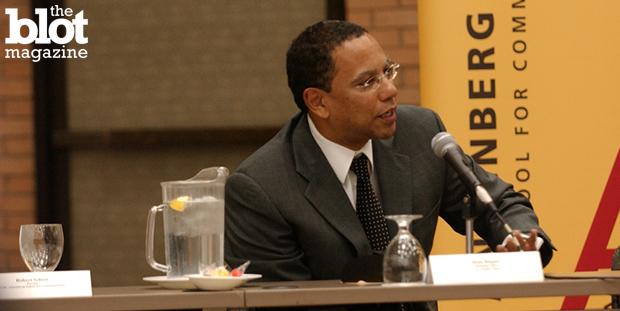
When Edward Snowden was getting ready to approach journalists with thousands of documents detailing once-secret domestic and international surveillance programs perpetuated by the National Security Agency, he considered a handful of reporters and news organizations he deemed trustworthy enough to appropriately handle the precious material and report on it in a fearless, straight-forward manner.
The New York Times was not one of those news organizations.
“It hurt a lot,” executive editor Dean Baquet said recently in an in-depth interview with Germany’s Der Spiegel. “We tried to catch up and did some really good stories that I feel good about. But it was really, really, really painful.”
By proxy, Der Spiegel was one of the news organizations Snowden deemed worthy of receiving some of the clandestine documents — detailing, among other things, that the NSA had set up listening posts at U.S. military installations throughout the country and for years had secretly bugged the cellphone of German Chancellor Angela Merkel.
Read more: TheBlot Magazine’s Continuing NSA Coverage
The Washington Post’s Barton Gellman was another journalist who received a handful of the Snowden documents. So, too, did filmmaker Laura Poitras, who was instrumental in recruiting former Guardian journalist Glenn Greenwald. Greenwald broke the initial story about NSA spying based on Snowden’s documents, disclosed Snowden as his source in a follow-up report and later published a tell-all book on the experience.
“Snowden had been clear from our first conversation about his rational for distrusting the establishment media with his story, repeatedly referring to the New York Times’ concealment of NSA eavesdropping,” Greenwald wrote. “He had come to believe that the paper’s concealment of that information may very well have changed the outcome of the 2004 election.”
“It meant two things,” Baquet said of the snub. “Morally, it meant that somebody with a big story to tell didn’t think we were the place to go, and that’s painful. And then it also meant that we got beaten on what was arguably the biggest national security story in many, many years. ”
Snowden’s decision was not an oversight: The whistleblower deliberately skipped over the New York Times after learning the newspaper had information about a dragnet NSA surveillance program that captured the content of e-mails sent by Americans, but withheld reports on the topic at the request of the Bush administration. The paper eventually broke the story, but only after reporter James Risen threatened to expose the program himself in a forthcoming book.
“It’s easy to look at it now and say, how could the New York Times not have published the story?” Baquet said in the interview. “But I won’t judge them because I wasn’t [t]here, and I don’t know what the discussions were like.”
When those discussions were happening, Baquet was on the other side of the country leading the newsroom of the Tribune-owned Los Angeles Times. During his tenure at the LA Times, Baquet had the opportunity to blow open one of the biggest surveillance scandals at the time — and he passed on the opportunity.
In 2007, LA Times reporter Joseph Menn was approached by Mark Klein, a former AT&T employee-turned-whistleblower who possessed dozens of secret documents outlining a little-known NSA surveillance program. Under the program, AT&T was said to have cooperated with the spy agency in surreptitiously collecting the phone calls of millions of American citizens.
Read more: TheBlot’s Continuing Coverage of Government Surveillance
Menn was given the green light to pursue the story until editors were summoned by top government officials for an off-the-record meeting. Then-NSA Director Gen. Keith Alexander was one person who attended the meeting. Washington officials made it clear to the LA Times editors that if the story ran, it would have significant national security impacts — an excuse that had been used before in prior meetings with other newspapers, including The New York Times.
The excuse worked. Baquet told Menn that the story was dead. In a later interview, Baquet would claim his decision had nothing to do with the government, but was based upon the documents given to Menn by the whistleblower. Baquet said the documents were too technical and editors at the paper “could not figure out what was going on.” (The program was eventually exposed when Klein agreed to be a witness in a class action lawsuit filed by the Electronic Frontier Foundation. Menn left the LA Times in 2009 and now works at Reuters.)
Baquet’s decision to spike the story drew renewed interest last year when The New York Times announced that he would replace Jill Abramson as executive editor. Among his critics were Greenwald, who told the Huffington Post that Abramson was “probably the best advocate for an adversarial relationship between the government and the media,” while Baquet had “a really disturbing history of practicing this form of journalism that is incredibly subservient to the American national security scene.”
“If his past record and his past actions and statements are anything to go by, I think it signals that the New York Times is going to continue to descend downward into the sort of journalism that is very neutered and far too close to the very political factions that it is supposed to exercise oversight over,” Greenwald said.
Baquet said the notion that the he — or anyone on his staff — immediately capitulates to a government request not to run a story is wrong. “The reality is that the government makes the case 70 percent or 80 percent of the time to hold something for reasons of national security if it protects somebody’s life,” he said. “We weigh it and we discuss it. Most of the time, we run it anyway.”
That last part is what Baquet hopes will stand out in the minds of the next big leaker. “We [want to] show the next Snowden that we’re more willing than any news organization to cover the story,” he said. “And we have the bodies, the brains, and, I would argue, the guts to publish it.”
Matthew Keys is a contributing journalist for TheBlot Magazine.






